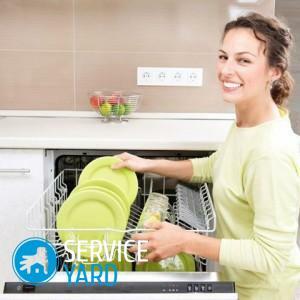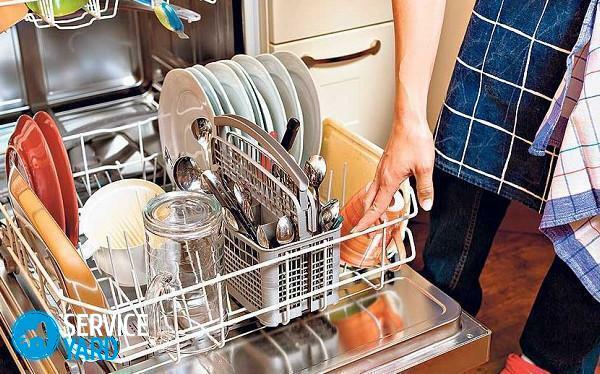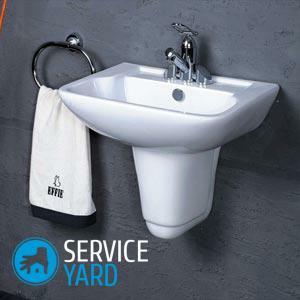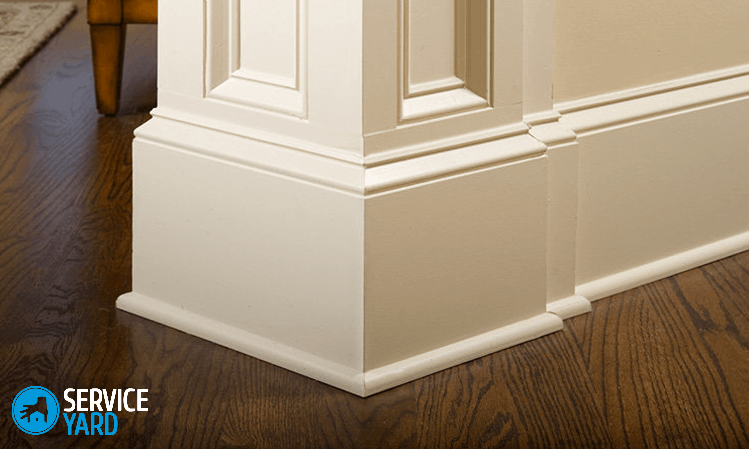
- The dishwasher began to wash dishes badly. Reasons for
- Reason # 1.Untimely cleaning of the dishwasher
- Reason number 2.Incorrect operation of the dishwasher
- Reason # 3.Incorrectly selected dishwashing detergent or dishwashing detergent
Almost every modern housewife has an excellent assistant - a dishwasher - among her kitchen equipment. Manufacturers of kitchen appliances have equipped the devices with the newest features and minimized the dimensions so that it can be built into small kitchens. With proper use and care of the machine, nothing should affect its perfect work. However, some landladies say that after some time the quality of washing leaves much to be desired. Why does the dishwasher wash dishes badly, how to fix such problems,?This is described in more detail below.
to the contents ↑The dishwasher began to wash dishes badly. Reasons for
The quality of the machine depends on many operational and constructive factors. Often, most consumers do not take them into account, stating that the device does its job well without their intervention. Naturally, while the dishwasher is new, it regularly and qualitatively copes with the most complex soiling of plates and pans. But it's not for long. With each subsequent use of the unit on the plates will remain traces of food, divorce and, much worse - white plaque.
This may be due to the following reasons:
- Untimely cleaning of the working parts of the kitchen unit.
- Incorrect operation of the appliance.
- Incorrectly selected detergent or large amount of detergent.
Each reason is quite important, so consider them in more detail.
to the contents ↑Reason # 1.Untimely cleaning of the
dishwasher Neglecting the basic rules for the care of kitchen appliances, your machine can very quickly fail. After all, everyone has known for a long time the fact: the more careful we are towards technology, the longer it pleases us with its excellent work. In the dishwasher, it is always necessary to keep the following basic parts clean.
Filter
This is a special mesh, in which the remains of food are collected. In most cases, it is located below the dishwasher. The reason that the dishwasher badly laundered dishes, it may be clogging up this part of the device. Clean the filter from dirt at least once a week.
Important! After each use of the dishwasher, check the filter, clean the tank of the machine and wipe the unit with a dry rag.
Water sprinklers
Food residues can clog not only the filter of the machine. Passing through the drainage holes, the remains of food from the plates can get stuck in them. Untimely cleaning can cause limescale formation. Subsequently - the pressure of water when the machine is running low, respectively - the dishwasher does not wash dishes.
How can I fix this? Start the cycle of work with the addition of a special washing liquid without plates and spoons.
coarse filter This filter is installed at the water inlet of the machine. A hose is connected to it, through which water is supplied. To soften the water, some impurities are added to it - they can clog the filter. The water pressure is subsequently reduced, and the dishwasher badly washes dishes and cutlery.
Heating Teeth
When heating water, especially if its rigidity is increased, scale is formed on the heating elements. If the cleaning is not carried out in a timely manner or special additives are not added to the anti-scale, the washing unit may not wash the dishes properly or even fail.
Important! Carry out a full-fledged cleaning of the dishwasher at least once every 6 months, regardless of the number of times it is used.
to the contents ↑Reason # 2.Incorrect operation of the
dishwasher If your dishwasher does not wash the dishes properly, the cause may be incorrect operation of the appliance. In this case, they are the following violations of the rules.
Incorrect laying sequence for cutlery
To put dirty dishes for washing into the machine, it is necessary with a certain sequence:
- In the user's manual, manufacturers for each brand describe how to arrange the dishes so that the washing effect is of the highest quality.
Important! Before using the dishwasher, be sure to read the rules for placing kitchen appliances.
- Place the dishes in such a way that the water completely drains down, and is not collected inside the container.

Overloading of the dishwasher
The more you load the machine with the dishes, the more densely it is placed, the more difficult it is for the water to wash the hard-to-reach places of the appliances. Therefore, in this case, do not complain that the dishwasher has started to wash dishes badly.
The unit must be loaded correctly:
- Do not stack the plates tightly together. There must be a small gap between them for water circulation.
- Dirty dishes in the lower compartment should not block access to water in the second compartment.
- Place the plates in such a way that they do not interfere with the moving parts of the device to rotate freely.
Important! If, for example, the compartment with detergent does not open, the dishes will not be washed, but the entire cycle will have to start again.
Incorrectly set operating mode
For the sake of economy, many neglect the application of the required operating mode of the machine:
- Highly polluted kitchen utensils at low water temperature or accelerated mode can not completely clean food.
Important! About how to correctly set the mode of operation of the device, manufacturers Bosh, LG, Elektrolux and other famous brands, described in detail in the instructions.
- The mode of many machines with a quick cycle of operation does not exceed the heating of water to 45-50 degrees. Cymbals, glasses or pots with dried food in this mode will not be washed.
Important! Before loading the kitchen items into the dishwasher, clean the surface of food residues. Thus, the quality of washing will improve, the filter will be less clogged.
to the contents ↑Reason # 3.Incorrectly selected dishwashing detergent or dishwashing detergent
Washes the dishwasher badly? One of the main reasons for the failure of the unit is non-compliance with the rules for the use of dishwashing detergent:
- To a greater extent, this situation can occur when replacing the usual means with cheaper ones. The solution to this problem is obvious: acquire the previously used one, or choose another suitable means.
Important! If the dishwasher does not wash dishes with a high-quality, effective and tested detergent, the use of an incorrect portion of the detergent may affect the operation of the kitchen appliance.
- Divorces on glass goblets and plates appear due to the use of an insufficient amount of rinse aid. To solve the problem, you need to change the fluid supply settings, namely, to increase the supply of the rinse aid.
Important! Do not increase this indicator too much. Otherwise - the dishes will shine very brightly, and the liquid can badly wash off from the surface.
- White stains on kitchen implements indicate the ingress of salt when falling asleep in the compartment or simply by its poor closing.
- No washed-up traces of coffee or lipstick on white appliances indicate the absence of a whitening component in the washing aid.
- Plastic dishes, as a rule, do not wash well in the dishwasher due to the mismatch of the detergent.
- The use of tools not intended for an automatic machine leads to a dishwasher washing dishes badly.
Important! The first time the use of liquids for hand washing dishes gives good results. Over time, such means are blocked by holes in the sprinkler, as a result - the quality of washing becomes much worse.
- Do not forget to regularly use a special salt to soften the water. If the dishwasher works without salt, the ion exchanger, which softens hard water, can clog or break down.
Important! In some regions, water has increased stiffness. Special 3 in 1 tablets do not replace special salt. It must be added in any case.
If your dishwasher, irrespective of the equipment manufacturer, does not wash the kitchenware properly, you should pay attention to the rules of its operation and the means used to operate it. Before you start, carefully read the manufacturer's instructions and recommendations, and strictly follow them. Then your assistant will make the dishes crystal clear, and you will have more time to relax.



